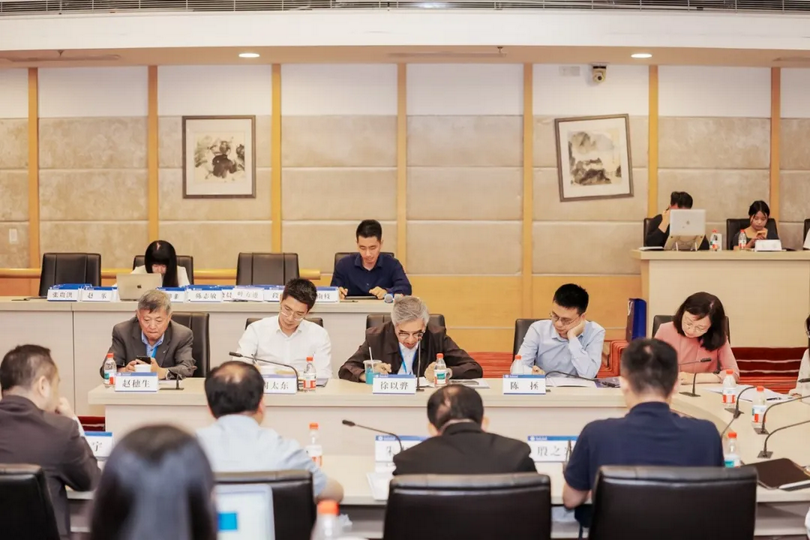On the afternoon of June 14, the sub-forum "Religion and International Relations After the 2024 U.S. Presidential Election" took place as part of the Fourth Fudan University Forum on International Relations. Organized by the Center for Religion and China National Security Studies at Fudan University, the session explored how religion influences diplomatic agendas and global politics amid current great power rivalries.
The broader forum, themed "Global Governance in an Era of Great-Power Competition," consisted of one plenary forum and five parallel sessions. The religion-focused sub-forum was convened by Dr. Yin Peixiao, associate research fellow at Fudan's School of International Relations and Public Affairs. It brought together scholars from multiple institutions to examine post-election religious-political dynamics in the U.S., China-Vatican relations, and the role of religious organizations in global governance.
Religion and the U.S. Election: Evangelical Anxiety and the Rise of Christian Nationalism
Huang Ping, associate professor at the School of International and Public Affairs, Shanghai Jiao Tong University, analyzed the interplay of immigration, religion, and U.S. politics in what she termed the "Trump 2.0 era." She described American secularization as a reactive process, noting that the influx of non-Christian immigrants has reshaped the U.S. religious landscape and triggered identity anxiety among white evangelicals. This anxiety has fueled a resurgence of conservative politics and manifested in the rise of Christian nationalism, influencing U.S. foreign policy on human rights.
Zhang Zhiping from the Naval Medical University reviewed the evolution of the "Christian New Right," referencing figures like Jerry Falwell and Pat Robertson. She emphasized that this religious-political force has not disappeared but is undergoing reconfiguration. In the 2024 election, Trump retained a distinct "Christian advantage," with white evangelicals ranking among his most supportive constituencies. As abortion became less central post-Roe v. Wade, issues like immigration and demographic shifts emerged as key sources of concern.
Vatican's China Policy and Its Subtle Tensions in Global Diplomacy
Xie Ziqing from the Shanghai University of Finance and Economics focused on Vatican foreign relations, particularly the Holy See's "globalized diplomacy" under Pope Francis and its engagement with China. He noted the unique global reach of the Catholic Church compared to other Abrahamic religions. China-Vatican interactions require delicacy and restraint. Xie also observed tensions between the Vatican's multilateral diplomatic ethos and the Trump administration's unilateral "America First" approach.
Religious Organizations as Shapers of the International Order
Several scholars examined the impact of non-state religious actors on global affairs.
Cheng Hongmeng, associate professor at Shanghai Institute of Socialism, traced the development of the Church of Jesus Christ of Latter-day Saints (Mormonism), highlighting its strong organization, stable growth, financial resources, and effective mobilization. As part of America's soft power, the LDS Church is a key participant in international religious freedom initiatives and a significant actor in global governance.
Duan Shilei from East China University of Political Science and Law discussed the case of the former Unification Church in Japan under the country's Religious Juridical Persons Law. He noted that the law reflects both Japan's post-WWII introspection on state-religion unity and American-imposed democratization frameworks. Duan further emphasized the influence of American religious ideology on the issue, pointing to the group's ties with Japan's Liberal Democratic Party and its political activities extending into U.S. political elites. The ideological framework of the U.S. International Religious Freedom Act has also impacted the debate surrounding the Unification Church's dissolution.
Niu Song of Shanghai International Studies University outlined the role of the Organization of Islamic Cooperation's (OIC) Jerusalem Committee in the Israeli-Palestinian conflict. He argued that despite limited media attention, such regional Islamic bodies consistently influence governance and conflict resolution in the Middle East. He urged researchers to go beyond superficial or trending topics and conduct in-depth studies of these impactful yet underexplored organizations.
From Iran to the U.S.: Religious Governance and Political Communication
Zhang Yuan from Shanghai International Studies University, drawing on her fieldwork in Iran, analyzes the recent resurgence of religious ideology at the core of Iran's political stability strategy. Iran has placed particular emphasis on discussions related to the Islamic political order in its recent political communication efforts. She points out that religion plays a crucial role in international conflicts partly because it embodies moral norms and expectations of order.
Wang Shuming, deputy director of the Shanghai Jewish Research Center at the Shanghai Academy of Social Sciences, examined the Trump administration's approach to combating antisemitism. He described it as unprecedented in intensity and elevated to a national strategic level. However, he also pointed out its ideological selectivity and securitization, serving as a tool to counter liberal Democratic values and communism. This new McCarthyist-style "anti-antisemitism" might, he warned, exacerbate political polarization in the U.S.
Additionally, Wang Jiani of Shanghai University offered a Global South perspective by analyzing Turkey's eastward diplomatic shift. Since 2019, Turkey has increasingly prioritized Southeast Asia as a key region for strategic identity-building and economic breakthrough. Through support for the Palestinian cause and distancing from Western "Europeanization" narratives, Turkey aims to reposition itself as a legitimate leader within the Global South. It also seeks to reduce dependency on Western-dominated systems through technological and economic cooperation with Southern countries.
Professor Xu Yihua, director of the Center for Religion and China National Security Studies, offered a framework for future research in strategic religious studies: "Look far—track global religious changes; look south—observe religion's influence in the Global South; look inward—study religion's role in China's national security and diplomacy; and look ahead—enhance forecasting of religion's impact on international relations."












